Healthcare Management Salary 2025: The healthcare management field is one of the fastest-growing, most stable, and financially rewarding professions across Tier One countries, including the United States, the United Kingdom, Canada, and Australia. As the global demand for healthcare services increases, driven by aging populations and technological advancements, skilled healthcare managers are becoming essential to the system’s productivity, safety, and profitability. Whether overseeing hospital operations in New York City, managing clinical services in London, or leading public health initiatives in Toronto or Sydney, healthcare management provides both high income and meaningful impact.
Table of Contents
Professionals entering this field are drawn not only by job security but also by the exceptional earning potential it offers. According to the U.S. Bureau of Labor Statistics (BLS), the median annual compensation for managers of medical and health services surpassed $110,000 in 2025, and this amount continues to rise each year. In top-tier cities like NYC or Los Angeles, experienced executives can earn upwards of $160,000, while similar roles in London or Melbourne command six-figure salaries in local currency alternatives.
This guide gives an in-depth examination of healthcare management salaries. You’ll identify how much professionals earn by country, city, and job title, which roles pay the most, and how education, location, and experience shape earning potential. Whether you’re just starting or planning to move into senior management, understanding the salary landscape helps you make more informed career decisions.
Key Takeaway: In 2025 and beyond, healthcare management offers qualified professionals consistent growth and a high return on investment by fusing purpose-driven leadership with competitive pay.
What Is Healthcare Management and Why It’s a Top-Paying Career Path in Tier One Countries
Healthcare management, also known as healthcare administration, involves planning, directing, and coordinating medical and health services. These professionals work behind the scenes in hospitals, clinics, and health systems to confirm smooth operations, regulatory compliance, cost efficiency, and patient satisfaction.
In Tier One markets, the healthcare industry is a trillion-dollar enterprise. For example, the U.S. healthcare sector contributes approximately 18% of the country’s GDP. The UK’s NHS, Canada’s provincial systems, and Australia’s Medicare network employ thousands of healthcare managers to maintain performance standards, budgets, and digital transformation initiatives.
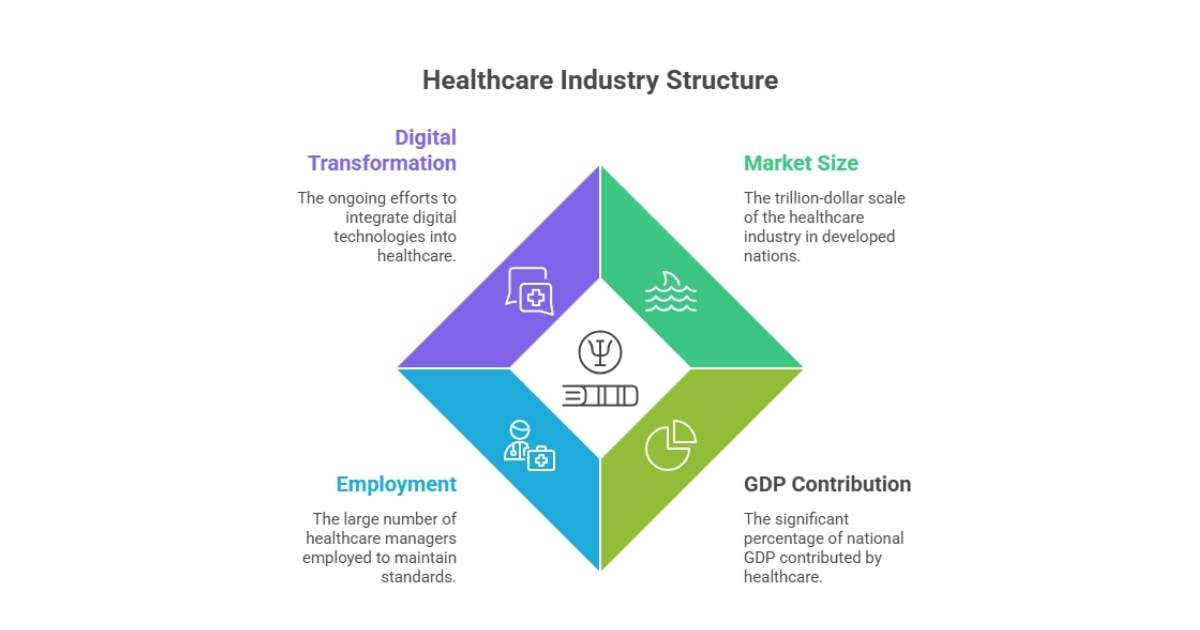
Why is it such a high-paying career path? The short answer: complexity, responsibility, and scale. Healthcare managers must navigate a range of challenges, including insurance systems, staffing shortages, patient safety protocols, and integrating technology. Their strategic decisions directly affect hospital profits and patient outcomes, making their roles indispensable.
Case Study:
In 2024, a major NYC hospital transitioned to a value-based care model, led by a team of healthcare managers. Within 12 months, patient readmission rates decreased by 20%, and the system saved $3 million in operating costs—proof that management excellence translates into measurable results.
| Country | Average Annual Salary (Mid-Level) | Top 10% Salary Range | Primary Employer Type |
| US | $115,000 | $160,000+ | Hospitals, Private Networks |
| UK | £55,000 | £95,000+ | NHS, Private Trusts |
| Canada | C$105,000 | C$140,000+ | Public Health Agencies |
| Australia | AU$120,000 | AU$160,000+ | Government & Private Hospitals |
How Much Does a Healthcare Manager Make? (US, UK, Canada, Australia Salary Overview)
Healthcare management salaries vary widely by region; however, one common factor across all Tier One markets is a strong earning potential.
United States:
The U.S. leads globally in pay. Entry-level salaries start around $70,000–$85,000, with mid-career professionals averaging $115,000–$130,000. In major metros like NYC or San Francisco, senior hospital administrators can make over $170,000.
United Kingdom:
In the UK, salaries are driven by NHS bands and private sector scales. Entry-level NHS managers earn around £35,000, mid-level professionals about £55,000, and executives earn over £95,000 in private hospitals or health tech firms.
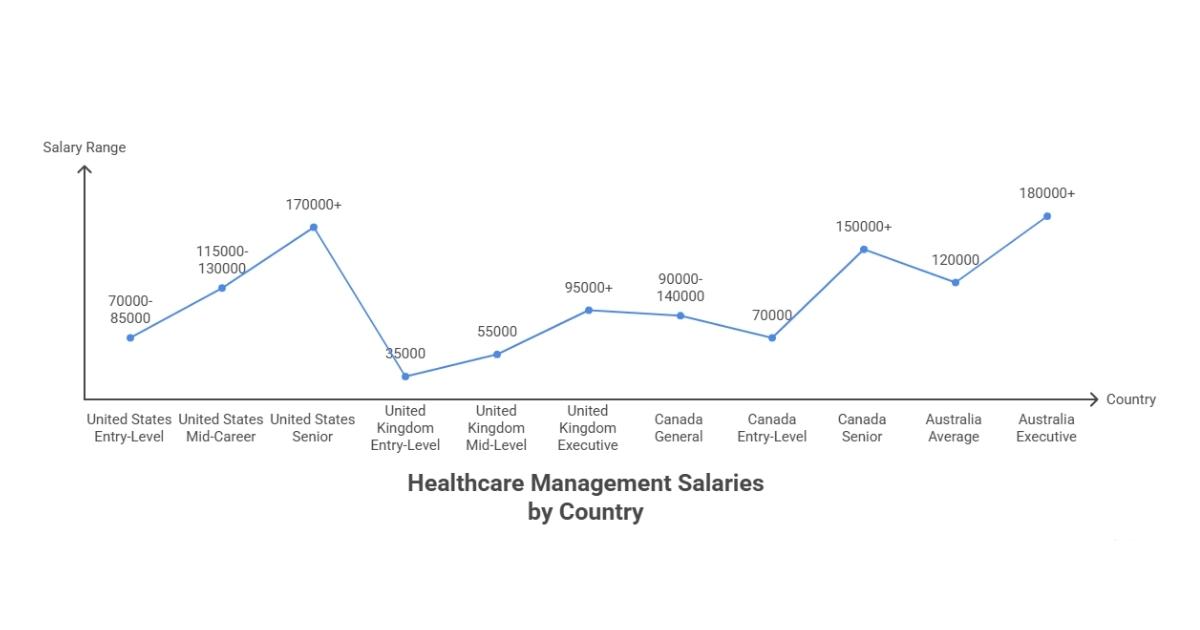
Canada:
Canadian healthcare managers typically earn between CAD 90,000 and CAD 140,000, with the highest wages in Ontario and British Columbia. Entry-level roles usually start at around C$70,000, often rising above C$150,000 for senior administrators.
Australia:
In Australia, healthcare management salaries average AU$120,000, with executive-level roles surpassing AU$180,000. Sydney and Melbourne lead in compensation due to high population density and private hospital competition.
Thinking of relocating? → Compare healthcare management salaries across Tier One cities before making your next career move.
Healthcare Management Career Outlook – Earning Potential and Future Demand in 2025
The global healthcare management outlook for 2025 remains exceptionally strong. In the U.S., employment for medical and health services managers is projected to grow by 28% through 2031, which is greatly faster than the average growth rate for all occupations.
In the UK, the NHS continues to expand leadership positions focused on digital health transformation, while Canada and Australia are investing heavily in healthcare infrastructure and support systems for an aging population.
Key Result: High demand means increasing pay scales. Across Tier One nations, salary growth in healthcare management outpaces inflation and other administrative fields by 12–18%.
Mini Case Study:
By 2025, her role had expanded to digital health coordination, and her salary had grown to C$135,000—a 42% increase tied to skill diversification.
Table: 2025 Projected Salary Growth by Country
| Country | Avg. 2020 Salary | Avg. 2025 Salary | % Growth |
| US | $100,000 | $118,000 | +18% |
| UK | £50,000 | £59,000 | +18% |
| Canada | C$95,000 | C$110,000 | +15% |
| Australia | AU$110,000 | AU$128,000 | +16% |
Healthcare management is a future-proof career offering rising compensation, flexibility, and leadership advancement.
Healthcare Management Salary Comparison by Country – Find the Best Market to Work In
When comparing salaries, the U.S. remains the most profitable, especially in private healthcare systems and major metropolitan hubs. However, professionals in Australia and Canada often enjoy better work-life balance and public-sector benefits.
| Metric | USA | UK | Canada | Australia |
| Average Annual Salary | $115,000 | £55,000 | C$105,000 | AU$120,000 |
| Cost of Living (Index) | 100 | 80 | 85 | 90 |
| Work-Life Balance Rating | 3.5/5 | 4.0/5 | 4.2/5 | 4.1/5 |
| Public vs. Private Split | 60/40 | 80/20 | 70/30 | 65/35 |
Factors That Influence Healthcare Management Salary: Education, Location, and Experience
Healthcare management pay depends on three primary variables—education, geographic location, and years of experience.
- Education: A master’s degree (like an MHA or MBA) can increase salary by 20–35%.
- Location: Tier One city managers (NYC, London, Toronto, Sydney) earn 25–40% more than national averages.
- Experience: Each additional year in management increases pay by approximately 3–5% until reaching a senior-level plateau.
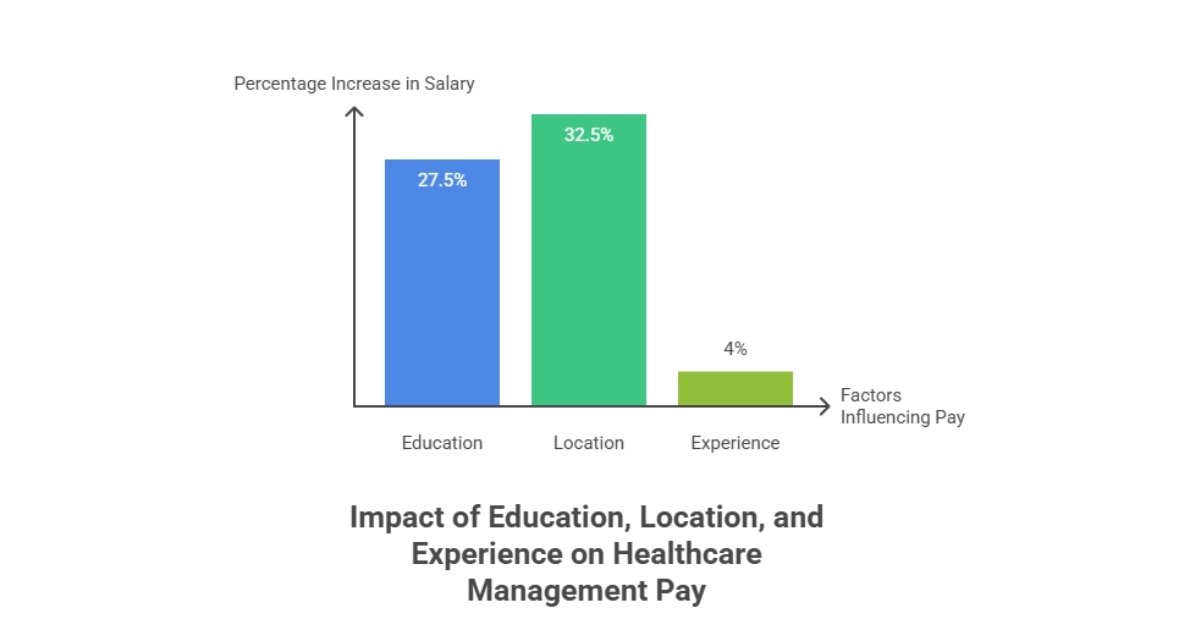
Employers value leadership training and data-driven decision-making. Experts in digital health or finance can command high salaries, according to Dr. Eleanor Wright, a London-based healthcare executive.
Average Healthcare Management Salary by Job Title and Experience Level (Tier One Data)
| Job Title | Entry-Level | Mid-Level | Senior/Executive |
| Healthcare Administrator | $70K | $110K | $150K+ |
| Hospital Operations Manager | $80K | $120K | $160K+ |
| Clinical Director | $85K | $130K | $175K+ |
| Health IT Manager | $75K | $115K | $145K+ |
| Public Health Manager | $65K | $100K | $130K+ |
“Digital and data leadership roles are seeing double-digit salary growth due to healthcare’s digital transformation,” reports Indeed 2025.
Highest Paying Positions in Healthcare Management and What They Require
Top-paying roles often require advanced degrees and 10 or more years of experience. Examples include Chief Operations Officer (COO), Hospital CEO, and Healthcare Strategy Director—each earning between $180,000 and $300,000 in the U.S.
Requirements:
- Master’s or Doctorate in Healthcare Administration or Business
- 8–15 years of experience
- Leadership in clinical or business operations
Pursue certification (ACHE, HFMA) and executive residencies to reach the upper salary tiers.
Lowest Paying Healthcare Management Roles – How to Move Up the Ladder
Entry-level coordinators and assistant managers earn between $55,000–$70,000. The path to higher pay includes:
- Completing a graduate degree (MHA/MBA).
- Gaining cross-department experience.
- Earning professional credentials.
Key Result: Professionals who upskill typically advance to mid-level management within 3–5 years, often doubling their salary.
Healthcare Administrator vs. Manager Salary: Which Role Offers Better ROI?
Healthcare administrators typically oversee departments, while managers oversee the entire operation. Administrators earn slightly less—about a $10,000 to $15,000 annual difference. However, administrators enjoy faster entry and promotion rates.
Start as an administrator to build leadership experience before transitioning to manager or director roles.
Healthcare Management Salary with a Master’s Degree – Is It Worth It?
Absolutely. A master’s degree boosts the average salary by 25% or more. For example, U.S. managers with an MHA earn approximately $130,000, compared to $100,000 for those holding a bachelor’s degree.
Key Tip: Choose accredited programs (CAHME, AMBA) for maximum employer recognition and salary impact.
How to Increase Your Healthcare Management Salary – Proven Strategies for Tier One Professionals
- Earn a relevant master’s or certification (MHA, PMP, ACHE).
- Negotiate relocation or hybrid benefits.
- Track industry benchmarks yearly.
- Specialize in finance, IT, or operations.
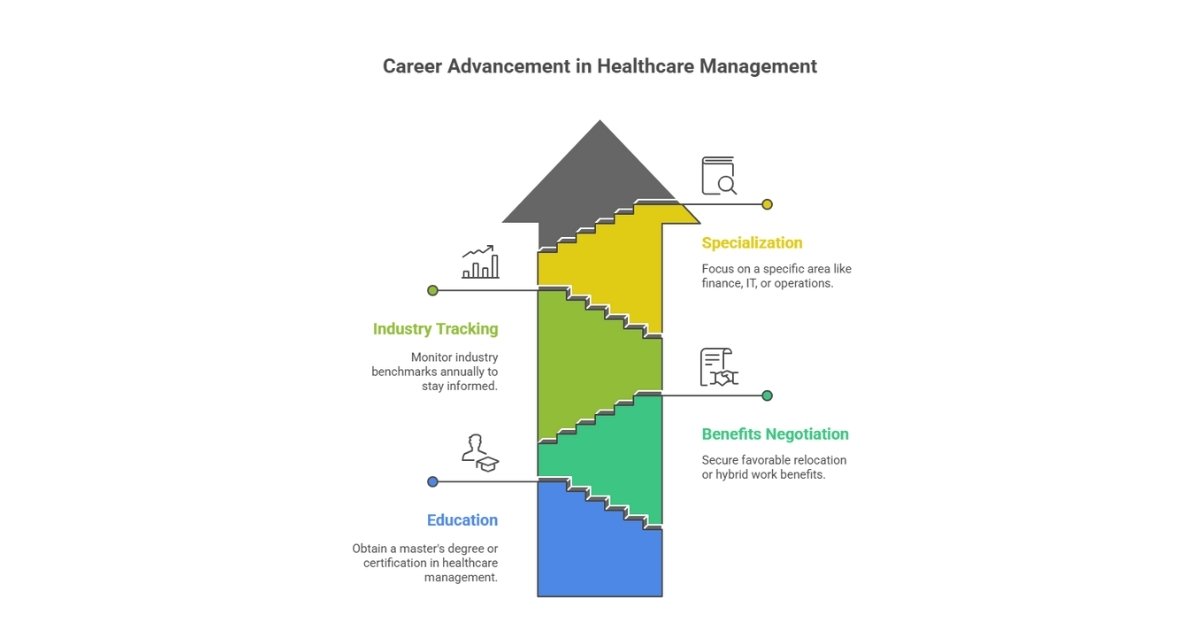
Where Can Healthcare Managers Earn the Most? Regional Insights for the US, UK, and Canada
Top US States: California, New York, Massachusetts.
Top UK Regions: London, Manchester, Birmingham.
Top Canadian Provinces: Ontario, Alberta, British Columbia.
High-paying regions correspond with advanced medical foundation and private system investment.
Top Skills That Boost Healthcare Management Salary in Competitive Markets
- Financial analytics
- Digital health systems (EHR, AI tools)
- Policy compliance
- Strategic leadership
Takeaway: Skills aligned with technology and efficiency lead to rapid pay increases.
How Education and Certifications Impact Healthcare Management Salary
Adding certifications such as FACHE, CPHQ, or Lean Six Sigma can increase pay by 10–15%. Advanced education signals credibility and long-term value to employers.
Why Healthcare Management Salary Are Rising in 2025 and Beyond
Increased healthcare spending, tech integration, and aging populations are driving wage growth. Healthcare organizations now compete globally for management talent, especially in digital transformation and policy leadership.
Case Study: How Healthcare Management Salaries Differ Across Public vs. Private Sectors (US/UK Focus)
Public-sector healthcare managers (in the NHS and state hospitals) earn slightly less but enjoy more substantial benefits. Private-sector roles in the U.S. and UK pay 15–30% more on average.
| Sector | Average Salary | Benefit Rating | Promotion Rate |
| Public | $100,000 | High | Moderate |
| Private | $130,000 | Medium | High |
Healthcare Management Salary Trends and Outlook – What Employers Are Paying in 2025
2025 marks a record high for healthcare management pay, driven by talent shortages and digital reform. Employers report offering signing bonuses, remote flexibility, and retention pay.
21 Career Paths in Healthcare Management and Their Average Annual Salaries
From hospital administration to healthcare consulting, the field offers over 20 career paths, with average salaries ranging from $80,000 to $250,000. Key roles include Clinical Operations Director, Health Policy Analyst, and Medical Practice CEO.
Healthcare Management Salary Variations: City, State, and Industry Segment
Urban areas dominate:
- NYC: $145K+
- London: £90K+
- Toronto: C$130K+
- Sydney: AU$150K+
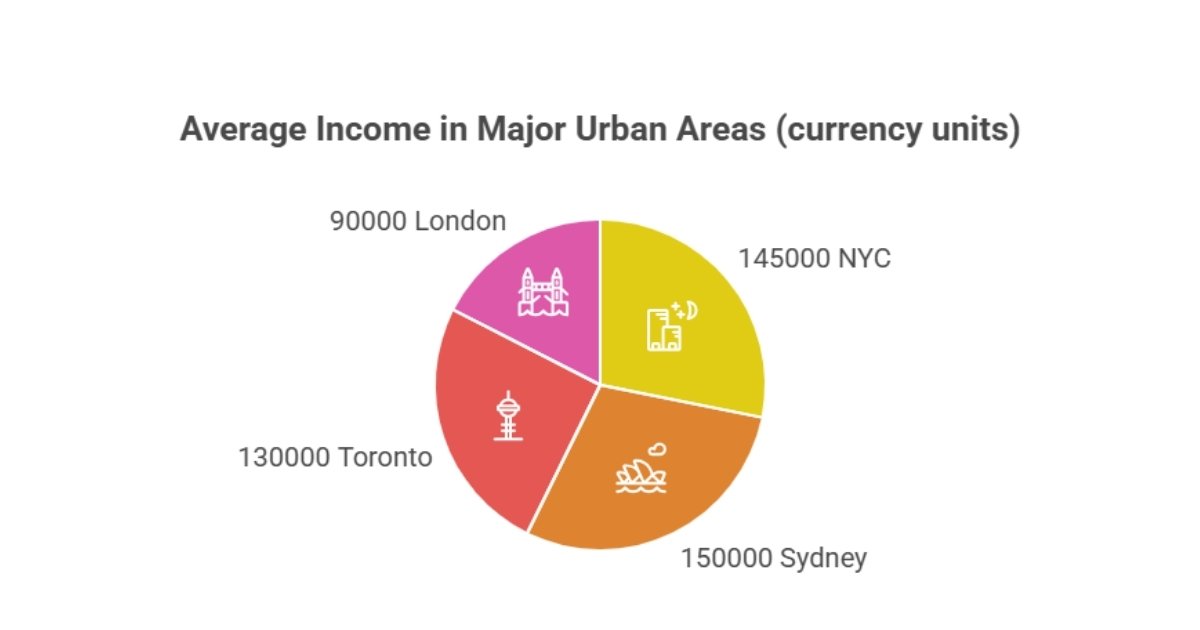
Top 10 Highest Paying Cities for Healthcare Management Jobs (US & Global Insights)
- New York City
- Los Angeles
- London
- Toronto
- Sydney
- Chicago
- Melbourne
- San Francisco
- Vancouver
- Boston
Most Searched States for Healthcare Management Salaries in 2025
California, Texas, Florida, New York, and Massachusetts lead the U.S. search trends for “healthcare management salary.”
According to the U.S. Bureau of Labor Statistics, the Median Salary for Healthcare Managers Reaches $110,000+
BLS 2025 confirms healthcare management remains one of the top 15 highest-paying non-clinical careers in the United States.
Indeed & Glassdoor Salary Reports – What Employers Are Offering in Major Tier One Cities
Indeed and Glassdoor show rising salary transparency. NYC listings now average $130,000, while Toronto and London roles hover around C$115,000 and £80,000, respectively.
Expert Insight: Healthcare Executives Reveal What Drives Pay Increases in the Industry
According to industry leaders, three factors drive 2025 salary growth:
- Digital health leadership
- Data analytics
- Strategic cost management
FAQs About Healthcare Management Salaries
What is the average healthcare management salary per month?
The average monthly healthcare management salary is around $9,500 in the US, £4,600 in the UK, C$8,700 in Canada, and AU$10,000 in Australia, depending on experience and employer type.
How much do healthcare managers earn per hour in the US and UK?
In the US, healthcare managers earn approximately $55/hour, while UK professionals average £26/hour, particularly in mid-level NHS roles.
What is the entry-level healthcare management salary in Canada and Australia?
Entry-level salaries typically start at C$65,000 in Canada and AU$70,000 in Australia, with steady growth as managers gain experience.
What are the best-paying healthcare management jobs?
Chief Executive Officer (CEO), Chief Operations Officer (COO), and Healthcare Strategy Director roles are the top-paying, often exceeding $200,000 annually in the US.
Does a master’s degree increase pay in healthcare management?
Yes, an MHA or MBA can raise earnings by 25–35%, improving job prospects and leadership opportunities.
How much do healthcare managers make in the UK vs. the US?
US managers average $115,000 annually, while UK equivalents earn £55,000–£95,000, depending on NHS banding or private sector level.
What is the highest-paying job in healthcare management?
Hospital CEOs and Healthcare System Directors top the chart, earning $250,000–$400,000 annually in large US or Australian systems.
Is healthcare management a good career choice in 2025?
Yes. With 25%+ job growth and strong salary inflation, healthcare management is one of the most secure and lucrative career paths in 2025 and beyond.